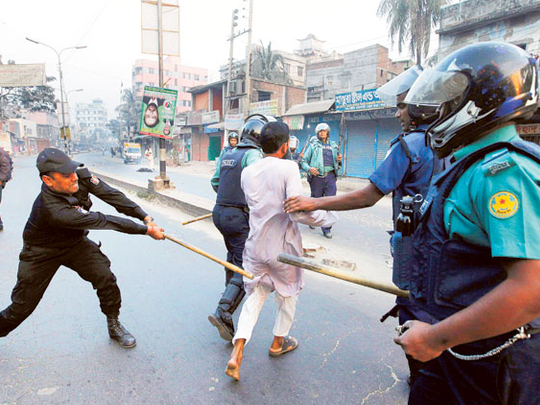
DHAKA: A special Bangladeshi tribunal today handed down life imprisonment to a stalwart of fundamentalist Jamaat-e-Islami (JI) for “crimes against humanity” he committed during 1971Li beration War.
“He (Abdul Kader Mollah) will serve life term,” pronounced chairman of the three-member International Crimes Tribunal Justice Obaidul Hassan as the 65-year old accused was brought before the court under heavy security vigil.
The judgment, however, said it found validity of five of the six charges like mass killings and rape.
The judgment came as the JI enforced a nationwide general strike demanding halt of the trial of their top seven leaders for 1971 war crimes siding with Pakistani troops while the country overnight witnessed torching of vehicles by suspected activists of the party killing a bus passenger.
This was the second such judgment by the tribunal in less than three weeks after it awarded death penalty to fugitive Abul Kalam Azad, an anchor of Islamic programmes in a private TV channel and former or expelled JI leader, on January 17.
Mollah, 65, was arrested on July 13, 2010, along with fellow party leader Muhammad Qamaruzzaman from in front of the Supreme Court premises to be exposed to justice as alleged perpetrators of crimes against humanity in 1971.
The tribunal indicted him on May 28, 2012 on six specific charges for actively participating, facilitating, aiding and substantially contributing to the attack directed upon the unarmed civilians, “causing commission of the horrific” genocides, murders and rapes.
But the judgment immediately sparked controversies with prosecution side and 1971 veterans saying the verdict upset them since there were specific charges of murders against him and in several incidents evidence were there Mollah himself took part in killings.
Attorney general Mahbube Alam in an instant reaction to media said the verdict “upset us as we expected the capital punishment for the crimes he committed” but the defence counsels were not available for comments.
Alam said the state side would decide later if they would file an appeal against the judgement after a detail review of the judgement.
Law Minister Shafique Ahmed, in an instant reaction from the government side briefly said it was the prosecutors who should decide if the verdict should be challenged in the apex Appellate Division of the Supreme Court reviewing the judgment and related documents.
“Bering a minister, I can’t tell you anything more about the judgment at this moment,” he told newsmen as approached for comments.
State Minister for law Quamrul Islam Chowdhury, however, said the verdict “upset the nation (and it was not the judgment, which the nation expected”.
Authorities meanwhile ordered a nationwide security alert coinciding with the judgment and the JI shutdown, the second in a week, to halt an ongoing war crimes trial while the JI activists took to the street torched several vehicles and attacked buses in the capital Dhaka and several other major cities.
The suspected JI activists last night set on fire a bus burning a passenger to death and injuring four others as they visibly tried to create a panic to enforce the strike against the war crimes trial with police identifying the dead a banker.
JI, a crucial ally of main opposition Bangladesh Nationalist Party (BNP) in a statement last night threatened the general strike to continue for indefinite period if the today’s verdict by the “controversial tribunal” against Mollah reflected the “government blueprint” to perish JI.
In an apparent shift from its earlier stance, BNP yesterday said unlike JI it has not opposed war crimes trial but it had questions about the fairness of the trial procedure while the main opposition party also did not extend “moral support” for today’s shutdown as it did during the last JI stoppage last week It will be the second verdict of the International Crimes Tribunals after January 14, when the special court handed down death penalty in its maiden verdict against fugitive former or expelled JI leader Abul Kalam Azad after his trial in absentia.
The hartal call came hours after police in a surprise move allowed the extreme right wing party, which opposed Bangladesh 1971 independence, to hold a rally at the heart of the capital after denied permission for months for staging such street protests.
“Police are not an enemies of any political party . . . They (JI) can hold peaceful rallies,” Dhaka’s police commissioner Benzir Ahmed earlier told newsmen.
Five people including a policeman died as sporadic violence gripped Bangladesh over a JI-enforced nationwide general strike on January 31 to halt an ongoing war crimes trial against seven of their top leaders while the country in recent weeks witnessed pitched battle between Jamaat activists and police.
JI was opposed to Bangladesh’s 1971 independence from Pakistan while the party sided with Pakistani troops during the Liberation War when officially three million people were killed while the fundamentalist party allegedly masterminded the murders of the country’s leading intelligentsia including professors, doctors and journalists.












